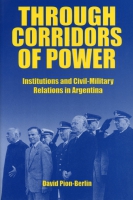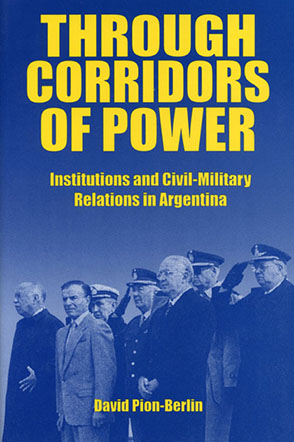Through Corridors of Power
Institutions and Civil-Military Relations in Argentina
David Pion-Berlin
“This is an exhaustively researched book, utilizing scores of interviews, extensive examination of the regional press, and displaying an excellent command of the existing scholarship. This study breathes new life into what had become somewhat ossified debates over the military’s political motivations and actions. Pion-Berlin well supports his central thesis that “as institutional designs change, so too does the civil-military balance of power.”
- Description
- Reviews
- Bio
- Subjects
To explain the workings of the new Argentine politics, David Pion-Berlin draws both on archival sources and on interviews with some one hundred civilian and military figures—from presidential advisers and members of Congress to senior officers from all branches of the military—to show how programs are debated by political actors and how authority is dispersed across numerous institutions. Pion-Berlin explains how Argentine democratic institutions mediate the sometimes differing interests of civilian and military authorities in order to determine whether or not soldiers succeed at defeating policies they oppose.
Eschewing conventional approaches that view the military as a domineering power, he shows that the government can either enable or constrain the military's authority and that the success or failure of civilian leaders in imposing their policy on the military is a function of the centralization of policy-making and the insulation of policy makers from external pressures. Case studies of three issues—accountability for human-rights violations, military budgets, and defense reform—exemplify this process.
“This is an exhaustively researched book, utilizing scores of interviews, extensive examination of the regional press, and displaying an excellent command of the existing scholarship. This study breathes new life into what had become somewhat ossified debates over the military’s political motivations and actions. Pion-Berlin well supports his central thesis that “as institutional designs change, so too does the civil-military balance of power.”
“The danger with this book is that it may be used as a model for studies of relations between institutions of civilian government and the armed forces in other countries, based solely on the Argentine national idiosyncrasies it stresses. In other words, the argument is convincing. The book’s value is that it makes it clear that national idiosyncrasies must be taken into consideration in future studies of state-military relations anywhere. In other words, it is well researched and written.”
“Through Corridors of Power offers a compelling prism through which to view civilian policy-making toward the military and is thus a significant contribution to the literature on civil-military affairs in Latin America. Superbly researched and written, it draws on a vast number of primary documents and interviews with top officials, including President Alfonsin. It includes an excellent chapter on comparative cases as well.”
“An innovative and thoughtful analysis of the interaction of civilian and military elites in Argentina’s ‘new’ democracy.”
David Pion-Berlin is Professor of Political Science at the University of California–Riverside. He is the author of The Ideology of State Terror: Economic Doctrine and Political Repression in Argentina and Peru (1989).
Mailing List
Subscribe to our mailing list and be notified about new titles, journals and catalogs.




